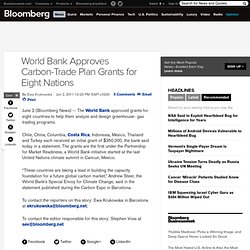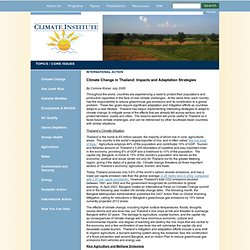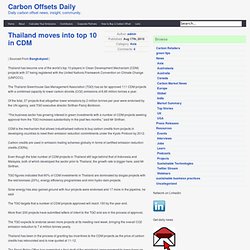

World Bank Approves Carbon-Trade Plan Grants for Eight Nations. June 2 (Bloomberg News) -- The World Bank approved grants for eight countries to help them analyze and design greenhouse- gas trading programs.

Chile, China, Columbia, Costa Rica, Indonesia, Mexico, Thailand and Turkey each received an initial grant of $350,000, the bank said today in a statement. The grants are the first under the Partnership for Market Readiness, a World Bank initiative started at the last United Nations climate summit in Cancun, Mexico. “These countries are taking a lead in building the capacity foundation for a future global carbon market,” Andrew Steer, the World Bank’s Special Envoy for Climate Change, said in the statement published during the Carbon Expo in Barcelona. To contact the reporters on this story: Ewa Krukowska in Barcelona at ekrukowska@bloomberg.net; To contact the editor responsible for this story: Stephen Voss at sev@bloomberg.net.
Thailand - Partnership Approves Grants for Eight Carbon Market Initiatives. Emerging economies present proposals for domestic mitigation schemes at Carbon Expo Barcelona, June 2, 2011 – Eight countries (Chile, China, Columbia, Costa Rica, Indonesia, Mexico, Thailand, and Turkey) have each received an initial grant of $US350,000 to help think through and plan how they will design, pilot, and eventually implement market-based instruments for greenhouse gas mitigation.
The grants are the first made under the Partnership for Market Readiness (PMR), a World Bank initiative launched at the UN climate change conference in December 2010. The idea of the Partnership is to build capacity in countries so that they can develop new market-based instruments to fight climate change. Each of the eight recipient countries will now develop a "Market Readiness Proposal" that will detail their plans. Mexico, for instance, is interested in developing a registry that would incorporate different carbon offset markets in one centralized system. Contacts: Change Case Study: Thailand. By Corinne Kisner, July 2008 Throughout the world, countries are experiencing a need to protect their populations and productive capacities in the face of new climate challenges.

At the same time, each country has the responsibility to reduce greenhouse gas emissions and its contribution to a global problem. These two goals require significant adaptation and mitigation efforts as countries adapt to a new lifestyle. Thailand has begun implementing interesting strategies to adapt to climate change, to mitigate some of the effects that are already felt across sectors, and to protect farmland, coasts and cities.
The lessons learned will prove useful to Thailand as it faces future climate challenges, and can be referenced by other Southeast Asian countries with similar situations. Thailand’s Climate Situation Thailand is the home to 65 million people, the majority of whom live in rural, agricultural areas. Rice Agriculture and Methane Emissions photo by Corinne Kisner Bangkok at Risk. UN Climate Change Conference Bangkok - April 2011. Thailand to cut down emissions by 20% Thailand plans voluntary CO2 market. Thailand moves into top 10 in CDM « Carbon Offsets Daily. | Sourced From Bangkokpost | Thailand has become one of the world’s top 10 players in Clean Development Mechanism (CDM) projects with 37 being registered with the United Nations Framework Convention on Climate Change (UNFCCC).

The Thailand Greenhouse Gas Management Association (TGO) has so far approved 111 CDM projects with a combined capacity to lower carbon dioxide (CO2) emissions of 6.95 million tonnes a year. Of the total, 37 projects that altogether lower emissions by 2 million tonnes per year were endorsed by the UN agency, said TGO executive director Sirithan Pairoj-Boriboon. “The business sector has growing interest in green investments with a number of CDM projects seeking approval from the TGO increased substantially in the past two months,” said Mr Sirithan. CDM is the mechanism that allows industrialised nations to buy carbon credits from projects in developing countries to meet their emission reduction commitments under the Kyoto Protocol by 2012. Related posts: